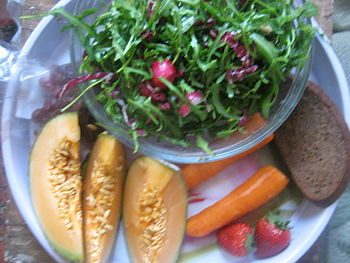Spring and summer are great times to try a vegetarian diet, if you're so inclined - with an abundance of fresh fruits and veggies packing the stalls of every farmer's market and roadside stand.
This month, in recognition of the start of the summer bounty, we'll be sharing some helpful tips and delicious, healthy vegetarian recipes. Remember, though, the rules of healthy eating still apply to the vegetarian diet - you need to make sure to add variety, balance, and moderation to whatever you eat.
Here are a few definitions and tips for going veggie.
 |
| Vegetarian food (Photo credit: Wikipedia) |
Because they don't eat meat, vegetarians will often wonder how they'll get enough protein. Although you may not realize it, the average American actually consumes more protein than he actually needs. For the lacto-ovo vegetarian, dairy products - particularly fresh eggs from pasture-raised chickens - are an excellent source of protein. Vegans on the other hand, can get their protein from nuts, seeds, and soy products (use caution with these, as some studies have shown that soy may actually be harmful for your health. If you choose to eat soy, be sure it is only the fermented kind, like tempeh and natto, which are much friendlier to the human body and less harmful than highly processed soy foods like soymilk and tofu).
Along the lines of beans, there are several to choose from, including green or red lentils, peanuts, split peas, pinto, kidney, and many more. Some of them you are probably already familiar with, such as kidney beans in chili, refried beans in Mexican dishes, red beans and rice, and pinto beans. Although some beans taste good as they are, many also do very well with different spices and seasonings to enhance their flavor. One cup of most types of cooked beans actually contains about as much protein as eating 2 ounces of meat.
 |
| Red kidney beans (Photo credit: Wikipedia) |
The nutrients of concern for vegans, who avoid all types of animal food, are vitamin B12, calcium, and vitamin D. In the average North American diet, the primary source for B12 is animals. In fact, it's actually somewhat hard to find a good source of B12 that's not animal-derived, so this is one of the most common deficiencies among vegans. Some soy products do contain a small amount of B12 (see above for caveats with soy), but most vegans should probably take a vitamin B12 supplement to be safe, as this is a very important vitamin for heart health.
For calcium, vegans can rely on fortified orange juice and calcium supplements. Beans and leafy green vegetables will also contain some calcium as well. In fact, kale and spinach both contain good amounts of calcium.
Although all types of vegetarians rely on mostly healthy, whole, simple food groups, watching your vitamin and calcium intake is something you should always do. This is very important for staying healthy. If you make sure to eat a balanced diet and include lots healthy, fresh, whole foods and stay away from the processed stuff, you'll be improving your odds of living a long, healthy life!
Stay tuned for some delicious vegetarian recipe ideas, and in the meantime, be sure to grab your free copy of our special e-book packed with healthy, tasty, and super-simple vegetable-based recipes: Cooking with 3 Ingredients or Less.

No comments:
Post a Comment
We welcome comments and suggestions!